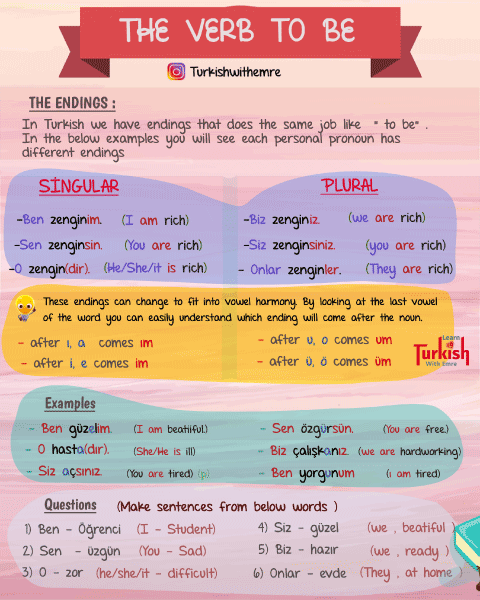The verb “to be” in Turkish Grammar
In English, learning “to be” verb at the start of the grammar lessons are essential. This lesson will be a start to the “to be” verb in Turkish grammar for you. After the lesson, there is a short but a complete test to measure your knowledge. I highly suggest you to make the exercises
It will be better to start with some examples to show you what is going on in Turkish with “to be “.
- Ben açım. (I am hungry. )
- Sen açsın. (You are hungry. )
- O aç(tır). (She/He is hungry. )
- Biz açız. (We are hungry. )
- Siz açsınız. (You are hungry. ) (Plural)
- Onlar aç(lar). (They are hungry. )
From the above examples you can see that for each personal pronouns, it is used different personal suffixes. It is enough to know just this for now.
Lets have a look at below examples
- Ben yorgunum. (I am tired. )
- Sen yorgunsun. (you are tired. )
- O yorgun(dur). (He/She is tired. )
- Biz yorgunuz. (We are tired. )
- Siz yorgunuz. (You are tired. )
- Onlar yorgun(lar). (They are tired. )
Look personal endings from the previous are little bit different. Only difference there are some changes on vowels. It is called vowel harmony in Turkish. I will give you the rules related with vowel harmony in Turkish.
Firstly, lets have a look at the personal pronouns and their related personal suffixes.
| Personal pronoun | Personal endings |
|---|---|
| Ben (I) | –ım, –im, –um, –üm, |
| Sen (You) | -sın, –sin, -sun, -sün |
| O (He/She/It) | -dır, -dir, -dur -dür |
| Biz (We) | –ız, –iz, –uz, –üz, |
| Siz (You) (plural) | -sunuz, -siniz, -sunuz, -sünüz |
| Onlar (They) | -ler, -lar |
From the above table table you can see that there are different personal endings. The way how we choose which one will be used related with vowel harmony.
Vowel harmony in Turkish
In vowel harmony, it is looked at the last vowel of the word before the personal ending comes.
In other way, we need to look at the last vowel of the word and then add the appropriate personal ending. Look at the examples below and then examine the table.
- Ben tokum. (I am full)
- Sen evdesin. (You are at home.)
- Türkçe zordur. (Turkish is difficult)
- Biz okuldayız. (We are at school.)
- Siz üzgünsünüz. (You are sad.)
- Onlar yorgun(lar).
From the below table you can examine the rules. To learn about the plurals you can visit the Plurals in Turkish.
| Last vowel | Personal endings |
|---|---|
| After ı , a | –ım, -sın, -dır, -ız, -sınız |
| After i , e | –im, -sin, -dir, -iz, -siniz |
| After ü , ö | –üm, -sün, -dür, -üz, -sünüz |
| After u , o | –um, -sun, -dur, -uz, -sunuz |
It seems little bit confusing or difficult. However, you will get used to them at soon. Now we can have a look at the examples what we do.
We learn some details until now. It is time to learn how to make sentence with to be verb.
How to make sentence with “to be” verb in Turkish
It is expected from you to know the above given lessons before using the verb “to be” in Turkish Grammar. Rest will be very easy.
- Firstly choose and object
Güzel – Beatiful
2. Choose the personal pronoun (Who will do the action ). Find it by asking “Kim – Who”. The answer will be your personal pronoun.
For example answer is “Sen – You”
3. Add the personal pronoun before the object
Sen güzel
4. Last step is to add the personal ending. We need to look at the last vowel of the object before we add the appropriate suffix.
- Sen güzel (Last vowel of the word is “e”)
Appropriate personal ending possibilities are Sen “-sin, -sın, -sun, -sün”
We know the last vowel of the objech (“e”). Appropriate ending would be (“-sin“)
- Sen güzelsin. (You are beautiful.)
Our sentence with “to be” verb in Turkish is ready with easy steps.
Now it is your time to solve the questions prepared for you. While solving the exercises related with Turkish grammar, get help from above examples.
You can also study the colorful Turkish grammar poster about the verb” to be” in Turkish with vowel harmony or you can get help while doing the exercises.
Turkish Grammar Exercises
[qsm quiz=19]
For support and learning Turkish easily with colorful pages, you can buy the book for Turkish for beginners from the shop.
Visit the Turkish Grammar page to learn about Turkish word order
Vectors in this page created by freepik www.freepik.com

